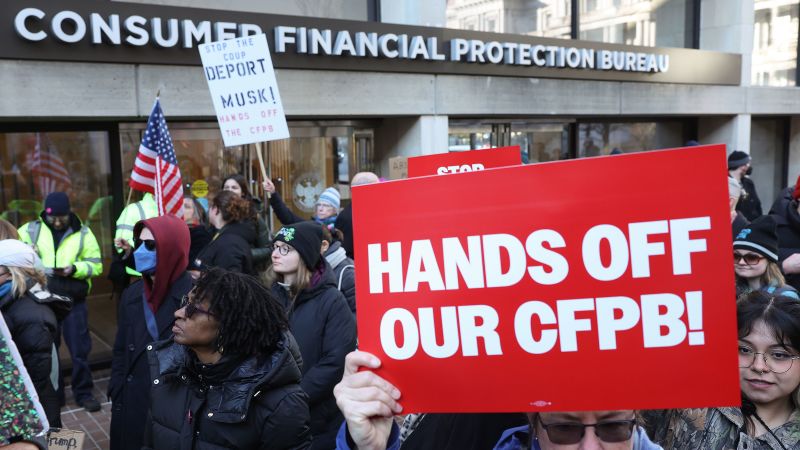In a significant ruling that might reshape the trajectory of the Consumer Financial Protection Bureau (CFPB), a divided federal appeals court has permitted President Donald Trump to proceed with plans to downsize this agency. This decision aligns with the administration’s broader strategy to modify government entities and their personnel, signaling a pivotal moment in the ongoing debate regarding regulatory oversight and consumer protection.
The context of this legal battle stems from months of contention initiated by groups representing CFPB employees and advocacy organizations that utilize the agency’s resources to defend consumers from exploitative banking practices. Following President Trump’s assumption of office, the CFPB underwent seismic changes, including the abrupt replacement of the agency’s director. Consequently, the administration paused various initiatives intended to safeguard consumer interests, resulting in heightened concern among stakeholders. In a bold move, the administration also canceled the lease for the CFPB’s headquarters and devised plans to reduce an overwhelming 80% of its workforce, further exacerbating fears over the agency’s future functionality.
In response to these drastic measures, a trial court judge in Washington, Amy Berman Jackson, intervened to halt near-complete shutdown efforts of the CFPB. However, the recent ruling from the DC Circuit Court determined that the agency’s employees would have to seek recourse against their employment terminations in other judicial venues, effectively bypassing the federal district court for such challenges.
Despite the appeals court’s decision to allow the downsizing, it did affirm that critical CFPB functions, such as addressing consumer complaints, must be maintained. The court’s ruling took into account the Trump administration’s assertion that there has been no definitive decision to entirely close the CFPB, remarking on the absence of any directive memo indicating such closure. This suggests that appellate judges took a more lenient view of the administration’s intentions.
Judge Greg Katsas articulated in the court’s opinion that, “We agree with the government that there was no reviewable decision to shut down the CFPB.” This perspective drew a distinct division among the judges, with Katsas and Judge Neomi Rao—both appointed during Trump’s administration—supporting the ruling while Judge Nina Pillard, an Obama appointee, dissented sharply.
The court’s ruling does not take effect immediately, allowing the impacted groups the opportunity to pursue further appeals. Pillard articulated her dissent by emphasizing the judiciary’s role in preventing the executive branch from dissolving federal agencies, arguing that this principle is critical to maintaining the constitutional separation of powers.
The CFPB itself, established post the 2008 financial crisis, has been a contentious point for conservatives eager to dismantle regulations perceived as overly burdensome and proactively pursued by Democrats in Congress. Within this ongoing legal landscape, more appeals and fresh legal interpretations regarding the structure and authority of the CFPB may well unfold, suggesting that the agency’s fate is still very much in contention.
Pillard’s dissent encapsulates a critical warning, stating that it would be “cold comfort to Plaintiffs” if they succeed in their legal challenges against the planned shutdown but find that the agency has been irrevocably weakened, rendering recovery impossible. She highlighted the potential ramifications of mass employee terminations, loss of operational contracts, and purging of vital data, foreboding a future in which the CFPB may struggle to regain its footing in consumer advocacy.
This ongoing saga surrounding the CFPB illustrates the complexity and stakes involved in federal governance and consumer protection, suggesting that both legal and operational battles are far from over. The discussions surrounding this agency underscore the delicate balance of power within the federal government and the lasting impact of political agendas on regulatory bodies designed to safeguard consumer rights.











